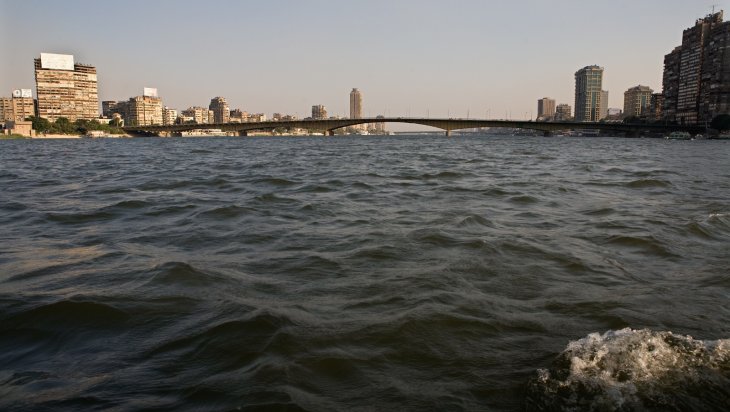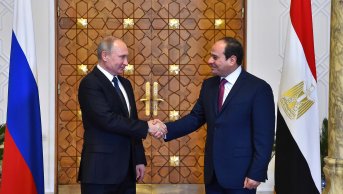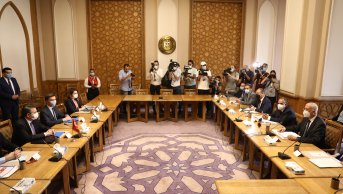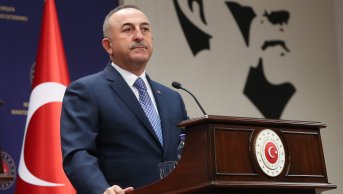Egypt’s Search for Internationalisation of the Renaissance Dam Crisis with Ethiopia

On 22 April, Egyptian Foreign Minister Sameh Shoukry travelled to Tunisia to meet with Tunisian President Kais Saied. This visit was the seventh and last stop in the Egyptian Foreign Minister’s Africa tour aiming to discuss the latest developments in the Grand Ethiopian Renaissance Dam (GERD) dispute between itself and the two other Nile countries: Sudan and Ethiopia. The trip, which consisted of visits to Kenya, the Comoros, South Africa, the Democratic Republic of Congo, Niger, Senegal, and Tunisia, illustrates the state of the long-standing GERD negotiations and Egypt’s concern and thoughts with regards to the impasse witnessed in the talks. Consequently, questions are raised on whether these talks can have a positive outcome or are future negotiations on the issue doomed to fail.
The Egyptian Foreign Minister’s tour comes in the context of the latest GERD negotiations which began on 3 April in Kinshasa, which was hosted by the President of the DR Congo and the current head of the African Union, Felix Tshisekedi. The talks, which ended on 6 April, failed to bring a resolution to the decades-long political conflict for the third time since the dispute was transferred from the mediation of the US and the World Bank to the African Union last year. According to the latest statement made by the Egyptian Foreign Minister at the Egyptian Senate’s Arab and African Affairs Committee, the upper house of the Parliament of Egypt, Ethiopia turned down the joint offer made by Egypt and Sudan to establish a quartet mediation group to solve the crisis. Based on the offer, which was initially formulated by Sudan, the mediation group would contain the US, the EU, the African Union, and the UN.
Since the failed negotiations in January 2021, after which Egypt and Ethiopia blamed Sudan for hindering the negotiations based on its rejection of the inclusion of African Union experts in the meetings, Cairo and Khartoum have been ‘on the same page’ with regards to the GERD negotiations. Despite being at odds in a number of issues, including the Hala'ib Triangle dispute, both countries have recently illustrated a certain form of rapprochement which resulted in a formal meeting between Egyptian President Abdel Fattah El-Sisi and the Chairman of the Sudanese Transitional Council Abdel Fattah Al-Burhan for the first time since the military coup against the long-time President of Sudan, Omar Al-Bashir. This rapprochement went as far as conducting a military exercise, symbolically named ‘Nile Eagles 2’, which also aimed to imply a sense of threat towards Addis Ababa. The close ties between the two heads of state has managed to reflect itself on the GERD dispute as both countries see the issue as a matter of national security.
Egypt relies almost exclusively on the Nile river for irrigation and drinking water at around 95%. Furthermore, more than 90% of Egyptians live on the Nile Basin. As a result, the GERD dispute is a matter of mammoth importance for the Egyptian government. Itself, along with Sudan, have demanded the creation of a legally binding agreement to establish the rules in filling and operating the dam, as it could diminish the share of water that flows down the river causing a significant water crisis in both countries. Consequently, Cairo and Khartoum see the involvement of external actors as a necessity to push the negotiations forward, with Ethiopia showing no signs in providing concessions to the two downstream countries.
Ethiopia, like Egypt and Sudan, sees the dam as a matter of national security. However, this approach is based on an opposite spectrum where GERD is a project of massive significance for the development and prosperity of the country. For Addis Ababa, GERD is a hydropower project that could provide electricity to 60% of the country’s population. Additionally, it is also expected to alleviate poverty by utilising the energy generated by the dam to later export to neighbouring countries in return for income. Having already conducted the first filling of the dam in July 2020, Ethiopia intends to undertake the second filling of the dam in July 2021 in spite of the uproar coming from Egypt and Sudan. In addition, Ethiopian officials have voiced that they would implement the second filling despite protests from abroad, which has further angered Cairo and Khartoum. This unilateral approach, as described by many diplomatic and media sources, brings us to the latest round of talks in the GERD dispute and the recent Africa tour conducted by Sameh Shoukry.
In spite of the failure of the GERD negotiations in Kinshasa, Cairo has been consistently highlighting the latest situation in the negotiations to foreign actors in the bid to conjure support for its stance in the dispute. The Egyptian Foreign Minister issued a letter to the chief of the UN Security Council last month, urging the international community to prevent Ethiopia from unilaterally acting on the second filling of the dam until a legally binding agreement was reached between the three countries concerned. At the same time, the foreign minister also sent letters to UN Secretary-General Antonio Guterres, with whom he also conducted a phone call, and President of the UN General Assembly Volkan Bozkır to explain the latest developments and the stages of the negotiations. The recent Africa tour of Sameh Shoukry also fits within this category of collecting international support. Not to mention, a similar tour was also made by the Sudanese Foreign Minister soon after, showing a potentially coordinated approach to the hampered negotiations.
This attempt at highlighting the situation is not the only one to come from Cairo. In an article posted by Foreign Policy and written by the Egyptian Ambassador to the US, Egypt asserted that Washington is the only actor that can save the GERD negotiations from the impasse that it has found itself in. Furthermore, the ambassador revealed that the real reason Addis Ababa has not accepted the agreement and abandoned Washington-sponsored talks is due to its rejection of any legally binding agreement. The article’s message and claims can be regarded as a signal illustrating the state of the negotiations from the perspective of Cairo’s highest-ranking diplomats. Despite the efforts of Egypt and Sudan, and the African Union, Ethiopia has stood unaffected against regional and international decrees in resolving the issue at hand, so much so that Cairo had no choice but to seek the US’ involvement to break the deadlock. As a crucial regional partner of the US in North Africa, Egypt’s demand from Washington intends to be the decisive augmentation in making Addis Ababa take a step back from its stance. Though, this may not be enough as well.
To conclude, Egypt’s attempt to internationalise the GERD dispute alongside Sudan has not shown any fruits as of yet, with the international community unable to pressure Addis Ababa to the extent of giving concessions. From the perspective of Cairo, Ethiopia’s insistence on unilateral action and its rejection of a legally binding agreement has left itself and Sudan with no other choice but to carry the dispute from a regional scope to an international one, while keeping its significance in regional stability. Egyptian Foreign Minister Sameh Shoukry’s visit to Kenya, the Comoros, South Africa, the Democratic Republic of Congo, Niger, Senegal, and Tunisia fits within the framework of the latter. At the same time, the statements made by the Egyptian Ambassador to the US, Motaz Zahran, reflects the extent to which the negotiations have stalled. All in all, Ethiopia looks unswayed from going ahead with the second filling of GERD in July, and a statement made by the Egyptian Foreign Minister on 15 April indicating that Egypt is prepared to handle the negative impact of GERD's second filling best shows Egypt’s short-term expectations on the GERD negotiations going ahead.










